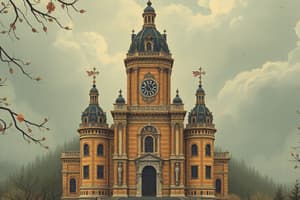Podcast
Questions and Answers
Where were the groups of liberal nationalism smaller in number until the late nineteenth century?
Where were the groups of liberal nationalism smaller in number until the late nineteenth century?
- Central and Eastern Europe (correct)
- North America
- Western Europe
- South America
What is the Latin root of the term 'liberalism'?
What is the Latin root of the term 'liberalism'?
- Unity
- Liber (correct)
- Freedom
- Nation
What did nineteenth-century liberals emphasize?
What did nineteenth-century liberals emphasize?
- The power of the Church
- The inviolability of private property (correct)
- The abolition of social classes
- The importance of monarchies
In revolutionary France, who was granted the right to vote?
In revolutionary France, who was granted the right to vote?
What was the brief period during which all adult males enjoyed suffrage?
What was the brief period during which all adult males enjoyed suffrage?
What was the status of women in the Napoleonic Code?
What was the status of women in the Napoleonic Code?
Who organized opposition movements demanding equal political rights in the 19th and early 20th centuries?
Who organized opposition movements demanding equal political rights in the 19th and early 20th centuries?
What was the concept that nineteenth-century liberals emphasized in government?
What was the concept that nineteenth-century liberals emphasized in government?
What was the primary outcome of the union's abolition of tariff barriers?
What was the primary outcome of the union's abolition of tariff barriers?
What did List hope to achieve through economic measures?
What did List hope to achieve through economic measures?
What was the primary outcome of the creation of a network of railways?
What was the primary outcome of the creation of a network of railways?
What was the result of the wave of economic nationalism?
What was the result of the wave of economic nationalism?
What was the primary goal of conservatives after 1815?
What was the primary goal of conservatives after 1815?
What did conservatives realise from the changes initiated by Napoleon?
What did conservatives realise from the changes initiated by Napoleon?
What was the outcome of modernisation, according to conservatives?
What was the outcome of modernisation, according to conservatives?
What was the primary difference between conservatives and liberals?
What was the primary difference between conservatives and liberals?
What was the common idea accepted as natural and universal across societies?
What was the common idea accepted as natural and universal across societies?
Who was Guiseppe Mazzini?
Who was Guiseppe Mazzini?
What was the significance of the Frankfurt parliament?
What was the significance of the Frankfurt parliament?
What was the main goal of the French revolutionaries?
What was the main goal of the French revolutionaries?
Who were Marianne and Germania?
Who were Marianne and Germania?
What was the significance of the 1848 revolution of the liberals?
What was the significance of the 1848 revolution of the liberals?
What was the role of women in nationalist struggles?
What was the role of women in nationalist struggles?
What did Napoleon introduce to make the administrative system more efficient?
What did Napoleon introduce to make the administrative system more efficient?
Study Notes
Liberal Nationalism
- Liberal nationalism emerged in early 19th-century Europe, allied with the ideology of liberalism, emphasizing individual freedom, equality before the law, and government by consent.
- It stood for the end of autocracy, clerical privileges, and the establishment of a constitution and representative government through parliament.
- Liberals also stressed the inviolability of private property, but equality before the law did not necessarily mean universal suffrage.
Nationalism in Europe
- European ideas of nationalism were not replicated elsewhere, but people developed their own specific varieties of nationalism.
- The idea that societies should be organized into 'nation-states' came to be accepted as natural and universal.
Conservatism
- After 1815, European governments were driven by a spirit of conservatism, aiming to preserve established institutions of state and society, such as the monarchy, the Church, and social hierarchies.
- Conservatives believed that modernization could strengthen traditional institutions like the monarchy, making state power more effective and strong.
Economic Nationalism
- The union abolished tariff barriers and reduced the number of currencies, stimulating economic growth and national unification.
- The creation of a network of railways further accelerated mobility and economic growth.
Key Terms
- Liberalism: derived from the Latin root "liber," meaning free, emphasizing individual freedom and equality before the law.
- Suffrage: the right to vote, initially granted exclusively to property-owning men in revolutionary France.
- Conservatism: a political philosophy stressing the importance of tradition, established institutions, and customs, preferring gradual development to quick change.
Studying That Suits You
Use AI to generate personalized quizzes and flashcards to suit your learning preferences.
Description
Explore the emergence of liberal nationalism in early 19th-century Europe, its key principles, and its impact on government and society.




